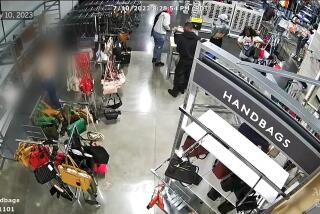Counter Spies
- Share via
If only they had known. The salesclerk at the department store might not have raised her middle finger, albeit jokingly, to an employee across the room. Maybe the fast-food counterman would have thought twice before making a point of telling a customer that she’d been given one too many chicken strips.
He certainly wouldn’t have picked the strip up off her plate and gobbled it down in her presence.
The technician at the smog certification garage surely would not have made suggestive remarks to his female customer. And the clerk at the upscale retail store never would have ignored the shopper in sweats and unkempt hair, offering service instead to someone younger and better dressed.
Not if they’d known that those people they dissed actually were spies, brought in by store owners bent on keeping their customers happy. Not if they’d known that these seemingly average Joes were being paid to report on anyone who treated them badly.
Employees almost never slight customers when management is in sight. That’s the beauty of the spies, or “spotters,” who are finding their way into large corporations, smaller companies and even government agencies.
If they weren’t nearly impossible to pick out, you’d see spotters at the next table at that chain restaurant, in line at the credit union, sitting across the aisle on that flight to San Francisco, or crunching popcorn behind you at the movies. He could even be the guy who asks you to dance at the local nightclub.
When “spotting” started out decades ago, the idea was to watch for employees who were stealing. But as smarter cash registers and better surveillance cameras have helped employees stay honest, the emphasis of spotting has shifted to quality of service.
Bud Meyerkamp is a private investigator who has been spotting for 35 years and whose Central Bureau of Investigation in Laguna Niguel focuses on restaurants, bars, hotels and casinos. “In America,” he says, “people don’t complain to the management. In Europe, they would tell the owner, but here they humbly endure the meal and then don’t come back.”
Elaine Locksley, president of the Locksley Group Ltd. in Pacific Palisades, tells her potential clients that just one unhappy customer can cost a lot more than they think.
“A person who has a bad shopping experience will leave and tell seven to 10 people about their bad experience,” Locksley says. “Just think about how devastating that can be.”
To help guard against that, people like Meyerkamp and Locksley keep small armies of spotters on call throughout the United States. Most are part-timers. They carry out their undercover assignments for as little as a free meal at a fast-food chain, in exchange for a check-list report--or they can make as much as $50 plus expenses for a lengthy, detailed narrative of a shopping or dining experience.
Seth Berg does his spotting at night and on weekends. By day, he works for EMI-Capital Music in Los Angeles, placing music in films and on TV. He says he makes about $13 for each fast-food restaurant he checks out. “You don’t do it for the money,” he says. “You do it for the fun.”
He knows that a bad report could cost someone his or her job, and he admits that sometimes he’ll try to play violations down. “There was a trainee at a fast-food place who broke some of the company’s rules,” he recalls. “I reminded whoever would be reading (the report) that the trainee was new and didn’t know. When somebody’s especially friendly, I’ll spin it a little if they forgot some little thing.”
But there are some things a shopper can’t ignore. Berg once was hired to order some clothing from a national mail order company. He says the person on the phone apparently thought she had put him on hold. “I heard her say to another employee, ‘Are we ever going to get any of the *%$&+%$! shirts in?’ Then when she realized I could hear her, she said, ‘*%&$!,’ and hung up on me.”
*
Cindi Ishigaki and a partner worked as spotters at restaurants for nearly five years, and Ishigaki always was amazed that the employees never figured out what she was doing.
“I thought for sure that we were busted when we were the only customers in the bar of a restaurant in Anaheim and we wrote up the bartender for giving us free drinks,” she recalls. “Then a year later we worked the same bartender on a busy Friday night. He remembered the things we chatted with him about a year earlier. . . . We figured he had received a copy of our report and had made it a point to remember us.
“But then he gave us another free drink, and we knew he was oblivious.”
Spotters often don’t find out what happens to the people they write up. Most services provide the reports to top management, which may or may not share them with the employees who have been targeted.
Susan K. Meyer of the National Shopping Service in Los Angeles tells of a client, a home-decor store chain, that has incorporated Meyer’s spotting program into its employee agreement. “If the employee gets a low score on a ‘shop’ (as a scouting mission is called), we immediately re-shop the person. After a second bad shop, he goes on probation. If he scores low a third time, he’s out of there.”
But a report can bring a pat on the back, not just a kick in the pants. When the Burbank Post Office’s Downtown Station gets a good report, “the management either gives us a financial bonus or brings us all lunch,” says box clerk Sue Stimpson.
Larry Miller, president of Sit N Sleep, a chain of three mattress stores based in Montebello, pays to have every one of his salespeople shopped every other month. Miller says he sees a low score as an opportunity to help the employee improve.
Sometimes, Miller notes, there’s a reason for a bad report. “One of our best sales associates had a report that wasn’t up to standard. When I talked with him about it, I found out he was coming down with the flu.”
Employees can always disagree with a bad report, although the protests don’t always work. Meyerkamp still laughs when he remembers the bartender whom he saw put $50 into his pocket instead of the cash register.
“He went up before a labor board hearing. His excuse was that the bartender who was supposed to relieve him was late, and he had to go the bathroom really bad. He told the board, ‘Did you ever have to go to the bathroom so bad you couldn’t think? I didn’t know what I was doing.’ The board didn’t buy his excuse.”
Many former spotters say they never quite get over the experience. Ishigaki hasn’t worked as a spotter in years--these days, she is an assistant vice president of a large bank--but says she “still can’t go into a restaurant without looking for name tags and keeping track of how long it takes someone to greet us.
“But on the other hand, it’s made me more aware of how I treat people.”
More to Read
Inside the business of entertainment
The Wide Shot brings you news, analysis and insights on everything from streaming wars to production — and what it all means for the future.
You may occasionally receive promotional content from the Los Angeles Times.










